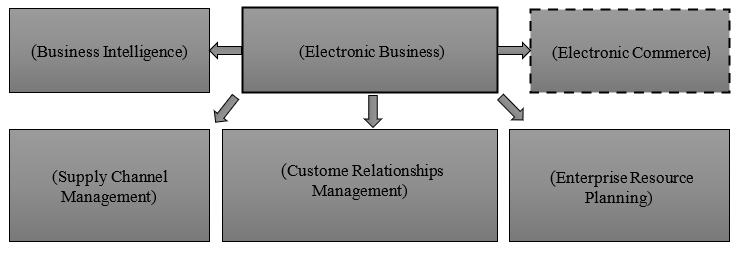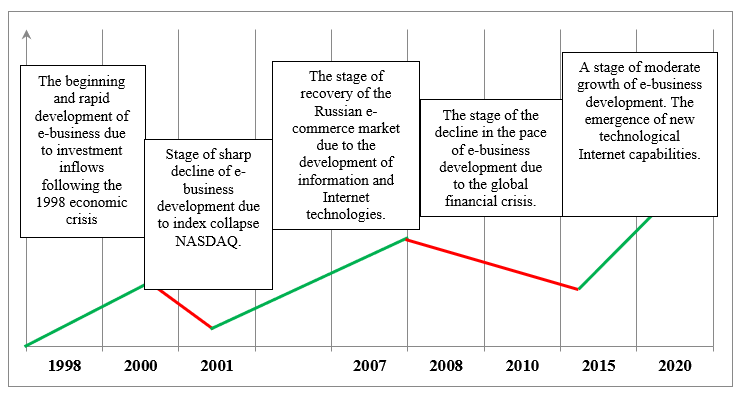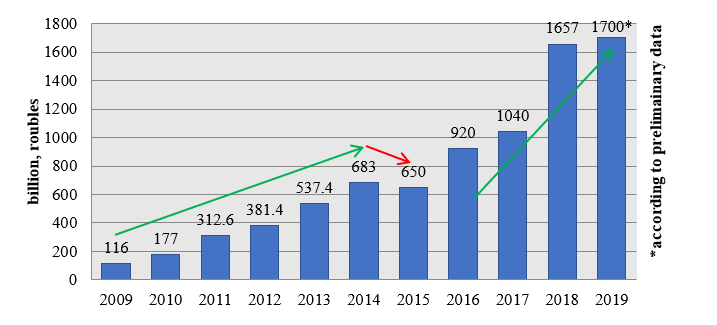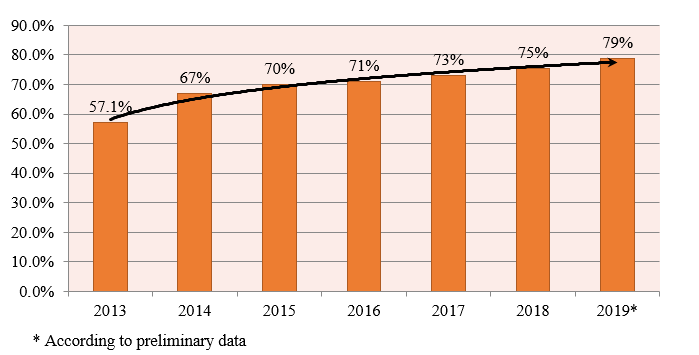Abstract
This article discusses the peculiarities of the development of the small and medium-sized enterprise sector in the Russian e-commerce market. The concept of “electronic business” is defined and its connection with “electronic commerce” is revealed, based on the scientific works of Russian and foreign scientists. The dynamics of the development of electronic business in Russia is described, which is characterized by a moderate increase in the volume of the electronic market, the number of Internet consumers and the number of small and medium-sized businesses. The comparative characteristics of Internet entrepreneurs in various periods of development of the Russian e-commerce market are given. The study highlights the key stages of the formation and development of electronic business in Russia, defines the role of small and medium-sized firms in the formation of modern electronic trade segments, forms a portrait of the Russian entrepreneur in different periods of development of the Russian e-commerce market. It was noted that despite the crisis in the national and global economies, the potential for increasing the number of new consumers in the Russian e-commerce market is huge, but its implementation requires intensive activity by small and medium-sized companies, as well as government support and the influence of large companies on the quality of national educational programs and the development of Internet technologies.
Keywords: Small and medium businessentrepreneurshipstatee-commerce
Introduction
Internet-based information and communication technologies provide a range of unique opportunities for business entities and, in particular, for the small and medium-sized business sector. Today, the electronic environment is part of the global economy, and the economic processes taking place through electronic and digital technologies are becoming a necessary and mandatory link in the formation of modern business.
Problem Statement
The theoretical understanding of the "information economy" began at the end of the twentieth century, but such concepts as "e-business," e-commerce "and" e-commerce "were transformed into identical definitions of modern definitions only in 2000-th years, when the Internet system entered a new stage of technical and technological development within the framework of the implementation of the Web 1.0 network base, and subsequently" Web 2.0 "(Structure of electronic business and organizational and economic conditions of implementation of business activity in virtual space, 2020). It is important to note that the penetration of web technologies into national economies has varied from country to country. The Russian e-commerce market has had and currently has some features caused by socio-economic and political changes in Russian society in recent decades. Thus, the above-mentioned concepts related to electronic business are assimilated by some domestic researchers, and by others, on the contrary, differentiated and separated. Thus, within the framework of this study it is advisable to define the concept of "electronic entrepreneurship" and to identify its connection with "electronic commerce," based on scientific works of Russian and foreign scientists.
From the perspective of electronic marketing specialist Raymond Frost, e-business is a collection of electronic commercial tools, information technologies and management operations produced in the Internet environment, with the aim of developing independent activities aimed at systematic profit generation (in the production and sale of goods or services through web channels) (Strauss & Frost, 2001). Some Russian researchers equate to this concept the content of the definition of "electronic commerce," which is most common in the theory of the domestic economy. However, according to modern ideas, electronic commerce is not a prototype of electronic commerce or electronic entrepreneurship: the latter involve not only electronic processes of purchase and sale, but also civil-legal, financial and credit transactions. According to the research of economist Gorshkova (2020) electronic-commercial interaction between economic agents should be defined not as "trade," but as "e-commerce," as in this case e-commerce is a form of economic activity, profit and basic economic procedures of which are expressed by means of electronic-digital technologies.
Research Questions
The study raised the following questions.
Determine the specifics of the development of the small and medium-sized business sector in the Russian e-Commerce market.
To reveal the concept of "e-business" and reveal its connection with "e-Commerce".
Describe the dynamics of e-business development in Russia.
Describe the stages of formation and development of electronic business in Russia.
Determine the role of small and medium-sized firms in the formation of modern electronic trading segments.
To characterize the portrait of a Russian entrepreneur in various periods of development of the Russian e-Commerce market.
Purpose of the Study
The aim of the study is to study the characteristics of the development of the sector of small and medium-sized enterprises in the Russian market of electronic commerce.
Research Methods
Based on the modern research of foreign and domestic researchers, it can be stated that in the context of the world economy the concept of "electronic commerce" is an integral part of the concept of "electronic entrepreneurship" (Figure

In summary, it can be concluded that the Russian equivalent of "electronic commerce" is not absolutely identical to the concepts of "electronic commerce" and "electronic entrepreneurship." However, the latter are related: e-commerce is part of e-business and involves economic, trade transactions through electronic and digital technologies. It follows that electronic entrepreneurship is a set of all forms of interaction between economic agents within the electronic environment and, in particular, in the Internet space. Then "small and medium-sized electronic entrepreneurship" is a type of economic activity of small firms, small and medium-sized enterprises, formally not included in associations, partially or completely representing their own business in the world network.
The development of the SME sector in the Russian e-commerce market since 1998 has been accompanied by rapid rises and sharp falls. The beginning of electronic entrepreneurship was the period from 1998 to 2000, when Russian entrepreneurs began intensive introduction into the electronic environment for the purpose of mass promotion of goods and services created by them, both in the domestic and foreign markets (Figure

The first responders and active users of the Russian e-commerce market were not only large private economic entities, but also representatives of the small and medium-sized business sector mainly from major cities of Russia: Moscow, St. Petersburg, Novosibirsk, Yekaterinburg, etc. The most popular form of e-commerce in 1998 was online stores, which were trading sites with many functions - prototypes of real trading transactions. However, due to the significant lag of various regions of Russia in the development of information and telecommunication technologies, these online stores had a very limited web audience. The electronic business of the economic worker developed within the territorial and national framework, which in turn constrained the entrepreneurial potential of the private. The use of Internet technologies in business development was auxiliary, and physical forms of outlets dominated over electronic ones.
In the following two years, in addition to web stores, information sites, postal services and an internet banking system were actively developed. Almost all types of small and medium-sized enterprises were more or less represented in the electronic environment, but not all business projects were effective and popular - for progressive development the world and Russian e-commerce market lacked demand. The first Internet entrepreneurs, despite the lack of experience in doing business in the electronic environment, highly appreciated their own business on the stock exchange and attracted a large number of investments from outside.
Rapid growth in network audiences in 2000 failed to mitigate the effects of the stock market crash. Excess funding into internet projects has led to a decline in shares of even successful firms. Most online stores and other shopping websites operated at a loss. A similar situation was observed in Russia: entrepreneurs who suffered bankruptcy left the e-commerce market, and entrepreneurs intending to develop business in the global network suspended or closed relevant projects altogether. In order to further develop Internet entrepreneurship, e-commerce participants needed to change their approach to web commerce: investors and business figures began to pay special attention to improving and applying conceptual models of Internet entrepreneurship.
The recovery of the Russian e-commerce market was gradual. Since 2001, representatives of the small and medium-sized business sector have actively used Internet resources to promote and market goods and services mainly through their own funds. Of course, Russian entrepreneurs experienced risks related to the insecurity of electronic transactions, insufficient development of Internet technologies, bureaucratic and legal difficulties accompanying various economic processes within the network. However, the stable growth of Internet entrepreneurs was observed until 2007. But already in 2008, the pace of e-business development in Russia slowed sharply due to the onset of the global economic crisis, which affected, first of all, the private sector. The crisis situation for Russian business figures was exacerbated by the following specific conditions:
low level of penetration of the Internet into regions of the country because of absence in the majority of the cities of necessary telecommunications;
absence at small and average businessmen of experience in use of tools of electronic trading;
low level of development of systems of electronic payments;
backwardness of post-delivery of products from the producer to consumers (especially in the remote regions).
At the same time, in Russia during the period under review, there were already prerequisites for the effective development of the small and medium-sized enterprise sector through an electronic network:
experience of the foreign states in creation of electronic trading actively was investigated, estimated and took root in practice;
information and communication infrastructure promptly developed and was actively supported in development by independent investors, business figures, developer programmers, IT specialists and so forth;
the business community supported the ideas of electronic commerce and promoted creation of educational programs for a potential personnel of online stores and other commercial websites;
in activity of public authorities trends in development of legal support of Internet business were defined.
Findings
The effects of the 2008 global crisis have had a greater or lesser impact on the Russian economy, but members of the global network (economic agents, the state, entrepreneurs, investors) managed to restore the growth rate of Internet trading facilities by 2010 and maintain this trend until the 2014 Russian currency crisis. In this period, the portrait of the average company in the SME sector can be described as follows (Table
From Table

The reason for the sharp decline in the volume of the Russian e-commerce market in 2015 was the deterioration of the international economic situation due to the fall in world energy prices. The protracted effects of the 2008 financial economic crisis were also important. However, the volume of electronic commerce increased by 29 % next year, which was due, on the one hand, to the intensive growth of the Russian Internet audience (Figure

Conclusion
Thus, today the stage of development of electronic entrepreneurship in Russia is characterized by moderate growth of the volume of the electronic market, the number of Internet consumers and the number of small and medium-sized businesses. The ups and downs of electronic commerce in Russia have significantly modified its structure. Most of the Internet entrepreneurs at the stages of birth and formation of e-commerce developed mainly book and high-tech industries of trade business in the network. At present, Russian entrepreneurs represent many more categories of goods and services in runet, including products of personal consumption, household purposes, light and heavy industry, electronics, etc. (Table
Despite the crisis situations in the national and global economy, the potential for increasing the number of new consumers in the Russian e-commerce market is huge, but its implementation requires intensive activities of small and medium-sized firms, as well as state support and influence of large companies on the quality of national educational programs and development of Internet technologies.
Acknowledgments
We would like to thank the anonymous reviewer for the constructive comments to improve the Manuscript.
References
- Besalov, A. A. (2011). History of e-business development in Russia. https://finbiz.spb.ru/wp-content/uploads/2011/04/bespalov.pdf
- Besnogov, M. V., & Semerkova, L. N. (2017). Trends of development of Internet audience of buyers in Russia. News of higher educational institutions. Volga region. Economic sciences, 2(6), 4-14.
- Gorshkova, L. V. (2020). Problem of definitions "e-commerce" and "Internet commerce". http://www.ifap.ru/pi/07/
- Milonova, M. V., & Arbatov, D. K. (2015). E-commerce in Russia: some problems and ways to solve them. International trade and trade policy, 3(3), 100-111.
- Problems and prospects of electronic commerce development in Russia (2020). https://studref.com/518518/zhurnalistika/problemy_elektronnogo_biznesa_rossii
- Russian Internet trading market in 2017: review of AKIT research (2020). https: // e-pepper.ru/news/rossiyskiy-rynok-internet-torgovli-v-2017-godu-obzor-issledovaniya-akit.html
- Structure of electronic business and organizational and economic conditions of implementation of business activity in virtual space (2020). https://port-u.ru/
- Strauss, J. A., & Frost, R. (2001). Electronic Marketing. Prentize-Hall.
- Shaykhutdinova, G. F., Nikonova, S. A., Karachurina, R. F., Sharipova, I. M., Korotkova L. N., & Sultanova, L. F. (2017). Stimulating of entrepreneurs' innovative activity in the republic of Bashkortostan. Journal of Fundamental and Applied Sciences, 9(7S), 1005-1015.
- Statistics of Internet trade in the countries of the world and in Russia (2020). https://www.shopolog.ru/metodichka/analytics/statistika-internet-torgovli-v-stranakh-mira/
Copyright information

This work is licensed under a Creative Commons Attribution-NonCommercial-NoDerivatives 4.0 International License.
About this article
Publication Date
20 October 2020
Article Doi
eBook ISBN
978-1-80296-089-1
Publisher
European Publisher
Volume
90
Print ISBN (optional)
-
Edition Number
1st Edition
Pages
1-1677
Subjects
Economics, social trends, sustainability, modern society, behavioural sciences, education
Cite this article as:
Khisayeva, A. I., Shaykhutdinova, G. F., & Rizvanova, M. A. (2020). Features Of Small And Medium-Sized Enterprise Development In The Russian E-Commerce Market. In I. V. Kovalev, A. A. Voroshilova, G. Herwig, U. Umbetov, A. S. Budagov, & Y. Y. Bocharova (Eds.), Economic and Social Trends for Sustainability of Modern Society (ICEST 2020), vol 90. European Proceedings of Social and Behavioural Sciences (pp. 112-119). European Publisher. https://doi.org/10.15405/epsbs.2020.10.03.14

